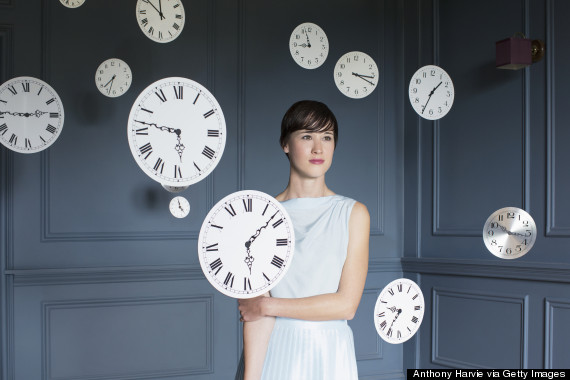
In the past 24 hours I've glanced at the clock approximately 245 times (give or take), paced around my cramped apartment while checking said clock, and texted "ETA?" to way too many people.
Hi, my name is Lindsay and I have "time anxiety."
I don't know how or why it started. In college I'd always run on "Greek time" as my sorority called it (a.k.a. at least 20 minutes behind everyone else). But after joining the real world, I've gained a brand new internal clock that simply will not allow me to be late. Lunch with a friend? I'll be 10 minutes early. A job interview? If I'm not there at least 15 minutes beforehand, I'll feel panicked.
Some say this newfound consideration for the clock is just a sign of growing up; others criticize me for being rude for not arriving at the designated time -- even if I'm early. The point is, I feel compelled to be prompt. But when does having a penchant for timeliness turn into something more... neurotic?
According to Alex Lickerman, M.D., author of The Undefeated Mind: On the Science of Constructing an Indestructible Self, I'm not alone: Many people experience this phenomenon on a frequent basis. In a post on Psychology Today, Lickerman explored his own struggles with time anxiety, and came to the realization that several issues are actually at play.
"I tie [this fear] to a deeper set of anxieties related to time -- something that can be defined more broadly," he tells The Huffington Post. "There's something about being late for something that feels unsafe, and general anxiety is provoked when people feel unsafe -- whether it's physically or psychologically."
Lickerman explains some common causes of time anxiety -- and some tips for managing that compulsion to always be on time.
Your time anxiety could just be FOMO manifesting in a different way.
We've waxed on before about how our fear of missing out can mildly disrupt our lives -- and that's no different when it comes to a fear of being late. Lickerman says our time anxiety may actually just be worry of being left out. "There are these social media conversations going on all the time that leave us with the feeling that ... if you miss out, you're going to be at a supreme disadvantage," he says. "[We believe] if we miss some key information or if we miss some important thing, we're going to be behind other people and not part of the conversation, and therefore ultimately left behind."
The good news: There are ways to reverse your fear of missing out (and hopefully, your time anxiety as a result). Try some of these positive tricks the next time you feel FOMO creeping in.
You may dread being late because you don't want to waste time.
As Lickerman writes in his blog, what really comes into play with time anxiety is a fear of time lost ("We know our time is finite," he says). As a result, being late to things can connect to that fear. He writes:
At some level, being late always triggers this question: am I creating the greatest amount of value with my life that I can? Will I feel, when it comes my time to die, that I spent too much of my time frivolously? Certainly I can't be concerned with creating value for others all the time. But if at the end of my life I don't feel that I spent the better part of it making some kind of contribution, I worry my life will feel like a wasted opportunity. So much suffering exists in the world. To me nothing seems a more important goal -- more weighty a goal -- than trying to reduce it.
Or ultimately, it's because you feel a lack of control.
When you're stuck in traffic, there's virtually nothing you can do to speed the process along to get where you need to go. That lack of control, Lickerman says, is an underlying reason for why he personally hates being late. "The anger I feel when I'm late comes from the desire to control my circumstances when I can't," he explains. "I can't control the fact that I'm stuck in traffic, so as a result I may snap at the people I'm with."
By not sweating the small stuff, a.k.a. life's traffic jams, you'll be a lot happier for it -- in fact, you may be able to use those moments to your advantage. Turn your wait time into an opportunity for mindfulness or reflection. Research shows that if you take stock of the smaller periods in life, you'll be much happier overall.
What are some ways to manage time anxiety?
There are ways to keep your anxieties in check if your heart starts pounding with every sweep of the minute hand. Lickerman suggests these simple tricks:
- First, be aware that it's happening. Take notice of any shifts in mood when you're getting ready to go somewhere. For Lickerman, time anxiety causes irritability. "When you're getting swept away by emotion, take a step back and recognize what's going on," he says.
- Reflect on the potential consequences. "Once I recognize why I'm experiencing this anxiety, I think about the consequences of this action," Lickerman explains. "It gives me enough perspective so I get ahold of the emotion and not have it overwhelm me. Usually when you stop to examine the consequences, they're pretty minor and often even non-existent."
- Imagine yourself being late. It may sound counterintuitive, but it works. This technique, which is also used as a way to treat anxiety disorders, can help you challenge irrational thought patterns associated with your fear. "I realize it actually won't feel as bad as I think it will and that knowledge helps to calm me down quite a bit," Lickerman says.
